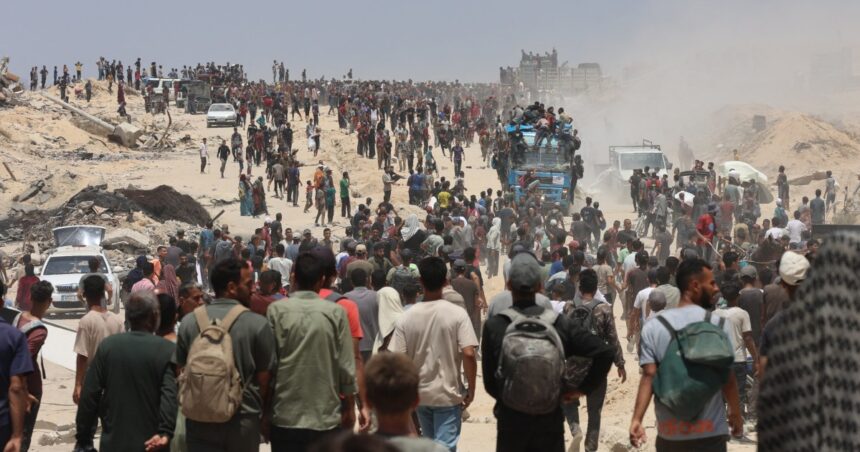In the shadow of Rafah’s abandoned warehouses, I watched as families searched through empty aid containers last week – a desperate scavenge for overlooked rice grains or flour dust. This scene has become distressingly common across Gaza, where the humanitarian crisis has reached catastrophic levels despite international pledges to prevent mass starvation.
“We wait for trucks that never arrive,” Mahmoud, a 43-year-old former teacher told me, his three children huddled nearby. “When aid does come, the distribution points become battlegrounds. People are dying from bombs, but many more will die from hunger.”
The numbers tell a grim story. According to the UN World Food Programme, less than 30% of needed food aid is currently entering Gaza, down from approximately 45% in March. This precipitous decline comes as Israel’s military operations in Rafah have effectively closed the crossing that previously handled over 60% of humanitarian deliveries.
David Beasley, outgoing WFP Executive Director, didn’t mince words during his final Gaza visit. “We are witnessing a systematic obstruction of humanitarian aid at a scale I’ve never seen in my career,” he said. “This isn’t just about logistics anymore – it’s about political will.”
The bureaucratic maze for aid delivery has become increasingly complex. Trucks wait at Kerem Shalom crossing for days, sometimes weeks, with perishable supplies spoiling before clearing inspection protocols. The UN reports that each truck undergoes an average of 17 separate checks before being permitted entry, a process that has lengthened since fighting intensified in May.
On the ground, the consequences are stark. UNICEF’s latest assessment indicates acute malnutrition rates in northern Gaza have exceeded 15% among children under five – well above the 10% emergency threshold. In Jabaliya and Beit Lahia, medical teams are reporting kwashiorkor cases – the severe protein deficiency characterized by distended bellies – at rates typically only seen in famine zones.
During my visits to makeshift clinics in central Gaza last month, doctors showed me handwritten charts tracking malnutrition cases. “We’re using outdated scales and measuring tapes,” Dr. Fatima Khalidi explained as she examined a listless two-year-old. “We don’t have specialized formula for treatment. The children who survive this will face developmental challenges for life.”
The politics surrounding aid delivery has become increasingly contentious. Israeli officials maintain they’ve approved all legitimate humanitarian shipments and blame distribution problems on UN agencies and chaos within Gaza. “There is no limit on humanitarian aid to Gaza,” Israel’s COGAT, which oversees civilian affairs in Palestinian territories, stated last week.
Yet this narrative contrasts sharply with reports from seven international aid organizations who collectively documented over 300 denied or significantly delayed aid convoys since January. Médecins Sans Frontières reports their medical shipments face an average 41-day delay – an eternity when treating trauma patients or malnourished children.
The international diplomatic response has intensified. U.S. Secretary of State Antony Blinken, during his seventh regional visit since October, emphasized that “concrete steps to improve humanitarian access” would be essential for continued American support. The European Union has similarly threatened to reconsider aspects of its relationship with Israel if aid flows don’t substantially improve by month’s end.
Jordan, Egypt and the UAE have attempted to circumvent bottlenecks through airdrops and maritime corridors, but these alternatives deliver a fraction of what’s needed. The recently constructed temporary pier off Gaza’s coast, meant to provide a workaround for land crossings, has faced operational challenges from rough seas and security concerns.
In eastern Khan Younis, I spoke with Ahmed, who coordinates local distribution for one neighborhood of displaced families. “The system has collapsed,” he said, showing me a notebook with hundreds of registered families. “When a truck arrives, we’re supposed to have orderly distribution, but people are desperate. Sometimes the strongest take everything while the elderly and disabled get nothing.”
The psychological toll of food insecurity compounds Gaza’s trauma. Mental health workers describe a population experiencing intense anxiety around basic survival needs. “Children wake up asking if there will be food today,” explained Maryam Dawood, a psychologist working with displaced families. “Parents feel profound shame when they cannot provide. This breaks something fundamental in the family structure.”
Economic analysis reveals the systemic nature of Gaza’s food crisis. Before October, approximately 60% of Gaza’s food was commercially imported. Today, that commercial supply chain has virtually disappeared. The World Bank estimates rebuilding Gaza’s food security infrastructure will require at least $485 million in immediate investment, with billions more needed for long-term recovery.
As night fell in central Gaza City, I watched families preparing their evening meals – often just boiled weeds or diluted lentil soup. Beyond the immediate emergency lies a deeper question about Gaza’s future food sovereignty. Without functioning markets, agricultural lands, fishing rights, and import capabilities, no amount of temporary aid will prevent chronic hunger.
The path forward requires immediate action on multiple fronts: streamlined inspection procedures, protected humanitarian corridors, restored commercial imports, and eventually, rebuilding of Gaza’s shattered food systems. Until then, each day brings Gaza’s population closer to a hunger catastrophe that will leave generational scars.
From the ruins of what was once Gaza’s breadbasket, it’s clear that food has become both sustenance and weapon – a reality that makes humanitarian principles increasingly difficult to maintain in a conflict where even bread has become political.






